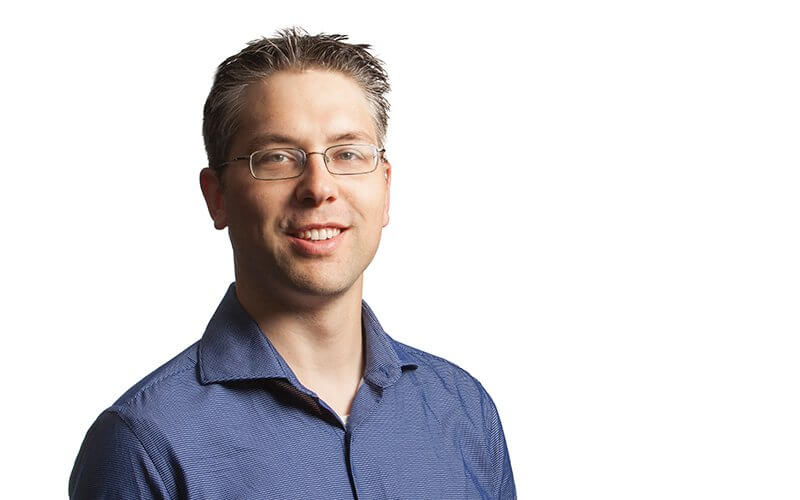
Computational chemist Michael Groves is committed to the success of Cal State Fullerton students by getting them involved in chemistry research early in their educational journey.
Groves has mentored more than 70 undergraduate and graduate students on projects that advance his research agenda since he joined the university in 2016. Due to the rigor of the major, he has also created learning interventions and flipped classroom environments to strengthen the educational experiences of his students.
For his work as a mentor and researcher, Groves has received the 2024 Henry Dreyfus Teacher-Scholar Award from the Camille and Henry Dreyfus Foundation. Fu-Ming Tao, CSUF professor of chemistry and biochemistry, was a recipient of the award in 2000.
“I’m honored to be recognized and strive to embody the teacher-scholar persona,” said Groves, associate professor of chemistry and biochemistry. “I continually work to improve my research practices and connect students with research and funding opportunities so that they can pursue educational endeavors and career paths they never considered possible.”
The prestigious national honor is given to early career faculty in the chemical sciences who have created an outstanding independent body of scholarship and are committed to the education of undergraduates. He is one of nine scholars nationwide selected for this year’s award.
Groves, who earned his doctorate in chemical and material engineering at the Royal Military College of Canada, was nominated by Peter de Lijser, chair and professor of chemistry and biochemistry.
“Dr. Groves is a superb instructor and top-notch researcher with a proven track record,” de Lijser said. “A significant part of his focus is integrating teaching and research, which is an important department goal as we work towards improving graduation rates and student success.”
As a Henry Dreyfus Teacher-Scholar, Groves received a $75,000 research grant for his latest project, “Using Machine Learning to Understand Gas Sensing Properties of 2D Materials.”
The project builds on his successful work to develop machine learning tools to determine the structure of physical hole defects — a “hole” in the structure that can impact the material’s electrical and chemical properties — in two-dimensional materials.
The properties of these materials could be promising candidates for use in leading-edge electronic devices and chemical sensors.
“The research project is innovative and highly engaging, which will increase students’ interest in the STEM fields, prepare them for a competitive workforce with technical skills and contribute to the rapidly growing research environment at CSUF,” de Lijser said.
As part of their major, de Lijser added that the college’s chemistry and biochemistry students take part in a capstone experience, which, for many, involves a research project under the mentorship of a faculty member.
“Undergraduate research projects must have objectives achievable in the limited amount of time, and mistakes are treated as opportunities to learn so students feel empowered to persevere and continue as STEM professionals,” said Groves, who teaches physical and theoretical chemistry.
Groves noted that hands-on research experiences allow undergraduates and graduate students to learn laboratory skills to prepare them for the STEM (science, technology, engineering and mathematics) workforce or advanced studies. Many of his students are also co-authors of his peer-reviewed research publications.
“It’s important for students to be involved in research early and often in their education so they build social and academic communities on campus. This involvement promotes persistence, retention and degree completion,” he said.
Groves has received external grant awards totaling about $1.5 million to support his research and students, including a $400,000 Faculty Early Career Development (CAREER) Program award from the National Science Foundation in 2021.
He has been awarded research funding from other agencies such as the U.S. Department of Defense, the U.S. Department of Energy and the American Chemical Society.
Groves’ research uses machine learning and quantum chemical methods to predict and characterize materials for energy, pharmaceutical and electronic applications. His work is geared toward characterizing chemical reactions over metal and two-dimensional surfaces.
Some applications include next-generation high-powered electronics, fuel cells, flow reactors for drug synthesis and green chemistry in industrial processes.